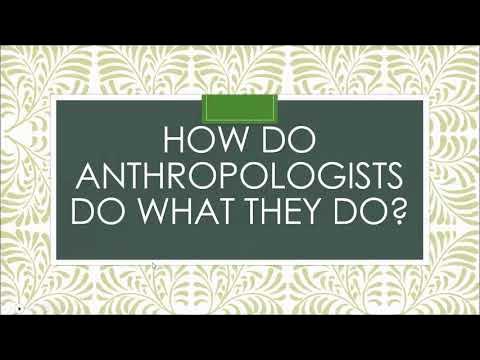Anthropology Day4- topic 1.4 ( Human evolution and emergence of Man)
Summary
TLDRThe lecture transcript delves into the anthropology course, focusing on human evolution and cultural development. It discusses the importance of understanding human evolution from a scientific perspective, including the biological and cultural factors that have shaped humanity. The lecture also covers the history of evolutionary thought, from ancient theories to modern scientific understanding, emphasizing the impact of environmental changes on human adaptation and speciation.
Takeaways
- 🌟 Anthropology is the study of human evolution and variation, both physical and cultural.
- 🌐 The course will cover important topics such as human evolution, biology, and culture.
- 🔬 Human evolution is traced back to the existence of the universe, approximately 20 billion years ago.
- 🌿 Life's origin is believed to have started in the oceans, evolving from simple organic compounds to more complex organisms.
- 🧠 The development of the human brain has played a crucial role in our evolution, enabling us to use tools, develop language, and coordinate in groups.
- 🗣️ Language and communication are key cultural aspects that have evolved alongside our biological changes.
- 🏃♂️ Early humans' transition from quadrupedal to bipedal locomotion allowed for the use of hands for tool-making and other activities.
- 🌏 Geographical distribution and environmental changes have influenced human evolution, leading to the development of different species and sub-species.
- 🔍 Studying fossils, comparative anatomy, molecular biology, and embryology provides evidence of human evolution and similarities with other species.
- 📚 This lecture is part of a comprehensive course that will explore these topics in depth, preparing students for exams and a deeper understanding of anthropology.
Q & A
What is the main topic of the lecture series?
-The main topic of the lecture series is Anthropology, specifically covering the evolution of humans and the factors that have contributed to our development.
What is the importance of studying human evolution?
-Studying human evolution is important because it helps us understand the changes that have occurred over time, how adaptations have developed, and the origins of life on Earth.
What does the lecturer suggest is the oldest part of anthropology?
-The oldest part of anthropology, according to the lecturer, is the study of physical anthropology, which focuses on human evolution and variation.
What is the significance of the theory of evolution in the context of this lecture?
-The theory of evolution is significant because it provides a scientific framework for understanding how species, including humans, change over time through genetic inheritance and adaptation to their environment.
How does the lecturer describe the transition from quadrupedal to bipedal locomotion in humans?
-The lecturer describes the transition as a significant evolutionary step where humans began walking on two feet, freeing up their hands for tool use and other activities, which in turn spurred brain development.
What role does culture play in human evolution according to the lecture?
-Culture plays a crucial role in human evolution as it has driven changes in behavior, social structures, and technology, which have all contributed to the development of the human brain and our survival as a species.
What is the concept of 'organic evolution' discussed in the lecture?
-The concept of 'organic evolution' refers to the gradual changes in the genetic frequency of a population over time, leading to the formation of new species, as explained by Darwin's theory of evolution.
Why is the study of fossils important in understanding human evolution?
-The study of fossils is important because it provides physical evidence of past life forms, allowing scientists to trace the lineage of human ancestors and understand the morphological changes that have occurred.
What is the lecturer's stance on the role of the environment in driving evolution?
-The lecturer emphasizes that environmental changes are a key driver of evolution, as species must adapt to survive in new conditions, leading to the development of new traits and eventually new species.
How does the lecturer connect the study of human evolution to modern-day humans?
-The lecturer connects the study of human evolution to modern-day humans by discussing how our ancestors' adaptations to past environments have shaped our current physical and cultural traits.
What are the different methods discussed in the lecture for studying human evolution?
-The lecture discusses various methods for studying human evolution, including the study of fossils (paleontology), molecular methods (molecular anthropology), embryological evidence (embryology), and classification based on geographical distribution.
Outlines

Dieser Bereich ist nur für Premium-Benutzer verfügbar. Bitte führen Sie ein Upgrade durch, um auf diesen Abschnitt zuzugreifen.
Upgrade durchführenMindmap

Dieser Bereich ist nur für Premium-Benutzer verfügbar. Bitte führen Sie ein Upgrade durch, um auf diesen Abschnitt zuzugreifen.
Upgrade durchführenKeywords

Dieser Bereich ist nur für Premium-Benutzer verfügbar. Bitte führen Sie ein Upgrade durch, um auf diesen Abschnitt zuzugreifen.
Upgrade durchführenHighlights

Dieser Bereich ist nur für Premium-Benutzer verfügbar. Bitte führen Sie ein Upgrade durch, um auf diesen Abschnitt zuzugreifen.
Upgrade durchführenTranscripts

Dieser Bereich ist nur für Premium-Benutzer verfügbar. Bitte führen Sie ein Upgrade durch, um auf diesen Abschnitt zuzugreifen.
Upgrade durchführenWeitere ähnliche Videos ansehen

Understanding the Self - Anthropology

spesialisasi antropologi

UJAR PRODI ILMU KOMUNIKASI PENGANTAR ILMU ANTROPOLOGI PERTEMUAN 1 DEFINISI ANTROPOLOGI, RUANG LINGKU

Introduction to Anthropology

UNDERSTANDING THE SELF (UTS): THE SELF IN ANTHROPOLOGICAL PERSPECTIVES | ASSIMILATION| ACCULTURATION

Chapter 1-2 "Anthropology's Four-field approach"
5.0 / 5 (0 votes)
